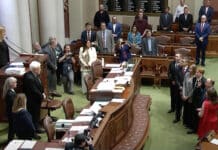St. Paul, MN – A unanimous 66-0 vote by the Minnesota Senate will send legislation to bring Minnesota’s tax code in compliance with federal standards to Governor Dayton’s desk, reports MPR.
The bill will provide $21 million in tax relief to approximately 220,000 Minnesotans. The House passed the bill unanimously last week. Dayton included such legislation in his proposal for $300 million of tax relief and should have no trouble securing his signature.
“Proud to sign bipartisan legislation providing $22 million in tax relief, the 1st bill this session we are sending to the gov’s desk,” Speaker of the House Kurt Daudt (R-31A) tweeted Thursday.
Lawmakers have prioritized this and other tax related legislation in an effort to have changes on the books prior to tax filing season.
Sen. Roger Chamberlain (R-38) chairs the Senate tax committee. According to Chamberlain, this bill is just the beginning of tax relief and reform planned for this session.
“We will smooth out the filing process for a lot of Minnesotans, avoid the hassles of a lot of paperwork and start to issue tax reforms for a lot of Minnesotans,” Chamberlain told MPR.
Dayton’s $300 million plan includes tax relief for farmers, students, parents paying for child care, and low income families. Republicans have promised to produce a tax relief package in excess of Dayton’s total.
Currently there are numerous proposals regarding the estate tax under consideration, including wholesale repeal. Current state law exempts all estates valued at $1.8 million or less. That exemption will rise to $2 million next year. Rates then kick in at varying levels, starting at 10 percent for the first $300,000 over the exemption limit. The estate tax rate peaks at 16 percent for anything over $10.1 million.
“My gosh, we tax you while you’re living, isn’t that enough?” House Tax Chair Greg Davids (R-28B) told MPR, “Now you’re dead, and we hit you again. That’s just not very Minnesota nice.”
There are also two proposals to raise the exemption level on the estate tax. One would raise it to $5 million, while the other would put it in line with federal laws by setting the bar to $5.49 million.











